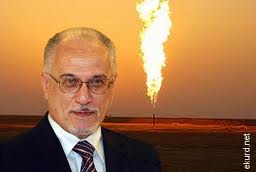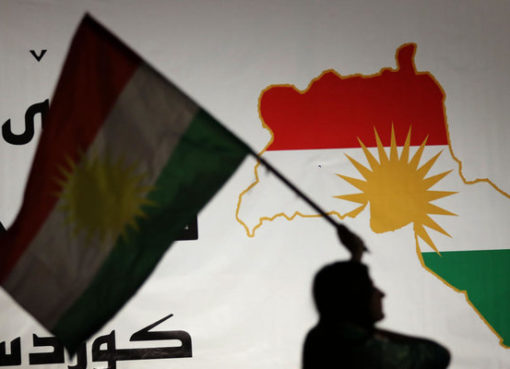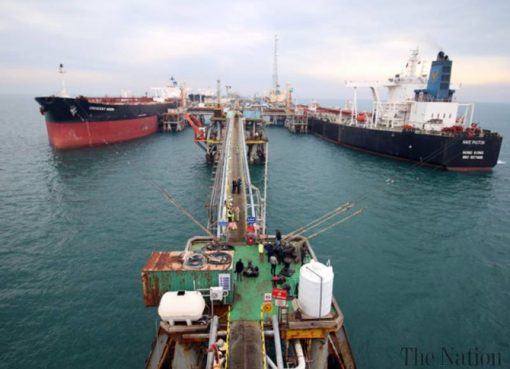Many in Baghdad fear that Iraq is falling apart, given the complex situation that saw the oil-rich country divided into three parts: an autonomous Kurdish region, a Sunni de facto state, while the Shiites, who took power of Iraq after the US invasion in 2003, are still in disbelief that the country they always dreamed of ruling is on the verge of division.
Hussein Shahrestani, Iraq’s deputy prime minister for energy affairs, met with Al-Monitor in Baghdad’s Green Zone and talked about the political crisis, the future of Iraq and the security of oil production and exports.
The text of the interview follows:
Al-Monitor: There are accusations that the Shiite political elite is responsible for what the country is going through. Is this true?
Shahrestani: Sure, the Sunnis aren’t happy with how things are going, while the other side has its own complaints, too. Therefore, we have to find solutions. When the demonstrations started last year, I was sent there (Anbar province) to discuss with the opposition their demands. We examined their demands and tried to find solutions; some needed legislation, which was impossible because parliament was politically paralyzed. One of the main problems that prevents finding permanent solutions is the lack of a unified Sunni leadership. In the 2010 election, the turnout in the Sunni-dominated areas was very high; they have a deputy prime minister, vice president and [parliament] speaker.
Al-Monitor: Today, the situation is complicated. Prime Minister Nouri al-Maliki’s bloc won (a plurality in) the election. He insists he’s the right person to head the new government, while other blocs, including Shiite blocs, have a different point of view, as they don’t want Maliki. Is there any exit strategy from this dilemma?
Shahrestani: Each bloc has the right to name its candidate for the prime minister’s post. Mr. Maliki’s bloc nominated him, while other blocs have a different point of view on this. There’s a consensus among the political factions that it’s the National Alliance bloc that should name the new prime minister, while the National Alliance until now hasn’t been able to agree on one candidate. My point of view is that we need to meet and try to reach a compromise and bridge differences because there’s a bigger battle ahead. What’s happening is that Iraq isn’t an Iraqi issue; Iraq is combating terrorism on behalf of all Muslims, because the terrorists are imposing a real threat to Islam. They are presenting our religion as a bloody path. Our prophet is the prophet of mercy, not a slaughterer.
Al-Monitor: Some reports suggested you might be a strong candidate to replace Maliki. Are you?
Shahrestani: I read these reports, but they are all rumors. The National Alliance until now has failed to come up with a unified name. There are differences, but we need to look ahead in the interest of the nation and find a way to get out of this tunnel.
Al-Monitor: Former [parliament] speaker Osama al-Nujaifi said he won’t seek a new term in office. He said this is because some members of the National Alliance told him that Maliki will withdraw if Nujaifi withdraws. But Maliki didn’t withdraw, so wasn’t this a way out of the political crisis?
Shahrestani: First, I want to express my respect for Mr. Nujaifi’s step. Yes, part of this problem was him insisting on running for a new term. Mr. Maliki’s bloc, the State of Law Coalition, and some other blocs within the National Alliance were opposed to that. Therefore, I believe he took a brave decision. We all need to look at the national interest, and I’m quite sure the Iraqis are aware of the dangers surrounding us and they’ll agree very soon on a road map (to get) out of this crisis.
Al-Monitor: It seems that this crisis revived Kurdish dreams of independence. Massoud Barzani, president of the Kurdistan Regional Government in Iraqi Kurdistan, said on several occasions that it’s time to seek independence. He said this, too, when US Secretary of State John Kerry visited Iraq, and he also mentioned that Article 140 of the Iraqi Constitution on the disputed areas has been implemented in Kirkuk province, stressing that “no return shall be for this decision.” What’s your take on this?
Shahrestani: There’s no consensus by the Kurds on what Mr. Barzani is saying. Many are [in favor of] Iraqi unity, despite the fact that they might be critical of the government, but they believe that separation will mean many problems for the Kurds. Therefore, I don’t think Mr. Barzani is reflecting the real view of the Kurds; besides, I think that such statements can’t be taken seriously given the fact such threats are unachievable due to regional and international circumstances. To our knowledge only Israel is backing this attempt, and we all know how Israel thinks. Israel wants to see more divisions within the region; they want sectarian and ethnic states so that they end up being the biggest and strongest. Every country including Turkey, the United States and [those of] the European Union, they all are against this notion.
Al-Monitor: What if the Kurds insisted on keeping control of the oil-rich Kirkuk province, what is Baghdad going to do?
Shahrestani: There are changes on the ground, not only in Kirkuk but in Mosul and Salahuddin. Things should be restored, the federal governments have to bring back all the lost areas including Kirkuk. There are constitutional and legal steps that should be taken. We said it clearly and conveyed the message to whom it may concern: Unilateral steps can’t be accepted.
Al-Monitor: Sources in Baghdad say that Kerry while in Baghdad asked whether your government is capable of securing the oil fields and oil exports. Is that true?
Shahrestani: I didn’t meet him, nor did I hear this from him, but for sure the United States has concerns when it comes to the security of the oil fields and oil exports because of the importance of Iraqi oil to the international market. But there’s no need for concern, we always try to put our guests and those who ask at ease by saying that most of the Iraqi oil exports are from the south; the same goes for production, and this wasn’t affected by the latest crisis. We raised the quantity of exports and production. In the past, we used to export from Jihan port in Turkey, but not anymore.
Al-Monitor: What about the Kurds’ decision to export oil?
Shahrestani: They agreed with Turkey on exporting the oil produced in [Iraqi] Kurdistan, despite the federal government’s refusal. But since then, four ships have sailed, one of them off-loaded at Ashkelon port in Israel and the remaining three are still looking for customers; nobody wants to buy stolen oil, no country wants to get into legal problems with Iraq. They offered discounts on the oil but they failed in selling them. Our stance is clear and I’ll reiterate it once again, neither [Iraqi] Kurdistan nor any other Iraqi province has the right to export oil; this is the duty and responsibility of the federal government. We have an agreement with Turkey that was ratified by both our parliaments, and they should abide by it. They shouldn’t allow the Kurds to use the pipelines to sell Iraq’s oil without permission, but they did this and they breached the agreement. Therefore, we’ll solve this in court.
Al-Monitor: Is Turkey aware of Iraq’s position?
Shahrestani: The Iraqi Ministry of Oil communicated with them, but they said that this is not their responsibility as it’s being done through the private sector. But we are aware that such moves, even through the private sector, can’t take place without an official green light.








Comment here